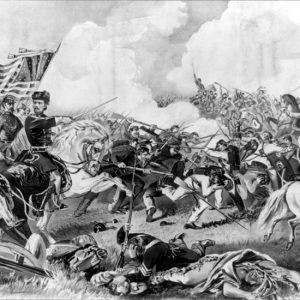calsfoundation@cals.org
Civil War Military Event Terminology
According to the National Park Service, there were more than 770 military activities in Arkansas between 1861 and 1865, ranging from relatively minor incursions into hostile territory to full-scale battles involving thousands of men. However, there are few if any sources detailing exactly what defines such things as an “action,” “affair,” or “engagement,” among other terms used for the military events of the Civil War.
The War of the Rebellion: A Compilation of the Official Records of the Union and Confederate Armies uses such terms as affair, expedition, and scout to describe various activities, but it does not include a definition of what those terms mean as to number of troops involved, duration, or similar considerations. Allen W. Jones and Virginia Ann Buttry referenced the Army Regulations and Rules of War of the Confederate States in establishing their 1963 survey of Arkansas military events during the war (published in the Arkansas Historical Quarterly), and Colonel H. L. Scott’s 1864 Military Dictionary offers limited insights into some of the terminology, as does Webb Garrison’s Encyclopedia of Civil War Usage. Merriam-Webster’s dictionary also has general definitions of each of the terms commonly used in the Official Records.
Action
There were at least two dozen military occurrences described as actions during the Civil War in Arkansas, including those at Hill’s Plantation in 1862, Devil’s Backbone in 1863, Fitzhugh’s Woods in 1864, and Dardanelle and Ivey’s Ford in 1865. Jones and Buttry write that an action “stresses the idea of active, frequently sharp, offensive and defensive operations,” while Merriam-Webster defines it as “an engagement between troops or ships” and Garrison calls it “a widely used but loosely defined term for an engagement between enemy forces; often treated as synonymous with battle.”
Affair
At least eighteen Civil War activities in the state are described as affairs, including one in 1862 at Galloway’s Farm, at McGuire’s in 1863, and at Kendal’s Grist Mill in 1864. Jones and Buttry simply call an affair “a fight”; Garrison defines it as “an engagement of minor size and consequence,” while Scott calls it “any slight action or engagement.”
Battle
Only three clashes in Arkansas are listed in the Official Records as battles, those being Pea Ridge and Prairie Grove in 1862 and Helena in 1863. Merriam-Webster says a battle is “a hostile encounter between opposing military forces,” and Jones and Buttry write that it is “usually a prolonged combat.” As a general rule, battles will involve larger numbers of troops fighting for a relatively extended period of time.
Campaign
Campaigns in Arkansas include those involving Pea Ridge and Prairie Grove in 1862, Little Rock in 1863, and the Red River in 1864, which included the Camden Expedition. Scott defines a campaign as “a series of continuous field operations,” while Merriam-Webster calls it a “connected series of military operations forming a distinct phase of a war.”
Capture
Jones and Buttry define capture as “to seize by force or stratagem,” and in Arkansas these include the capture of Van Buren in 1862, St. Charles in 1863, and Dardanelle in 1864.
Engagement
There are at least nine military activities listed as engagements, including fights at Bayou Fourche in 1863, Poison Spring and Old River Lake in 1864, and an 1862 naval encounter at Plum Point Bend on the Mississippi River. Merriam-Webster defines an engagement as “a hostile encounter between military foes,” and Jones and Buttry say it “may be a general encounter, as between armies, or a minor encounter as between subdivisions and outposts.”
Expedition
There are dozens of offensive operations categorized as expeditions in the Official Records, including the 1862 Fayetteville to Huntsville Expedition, 1863’s Berryville Expedition, the Expedition from Batesville to Elgin in 1864, and the Little Rock to Mount Elba Expedition in 1865. Scott states that an expedition “is an enterprise undertaken…against an enemy, the fortunate termination of which principally depends on the rapidity and unexpected nature of its movements,” while Jones and Buttry describe it as “a journey for a specific purpose, as a military or exploring expedition.”
Operations
Only a handful of Arkansas Civil War events are described as operations in the Official Records, including Greene’s Operations on the West Bank of the Mississippi River in 1864 and the operations around Bennett’s Bayou and Tolbert’s Mill in 1865. Merriam-Webster defines an operation as “a usually miliary action, mission or maneuver, including its planning and execution.” Jones and Buttry define it as “a military…action or mission including movement, supply attack, defense, and all requisite maneuvers.”
Reconnaissance
Reconnaissance missions, such as one to Berryville in 1862 and one from Little Rock toward Monticello and Mount Elba in 1864, are also rare among Arkansas Civil War events. Scott describes them as “warlike operations for the purpose of procuring information of the positions and strength…of the enemy.” Jones and Buttry call it “an examination of a territory to gain information on enemy troops, of the terrain, or of resources.” Garrison says a reconnaissance is “a systematic attempt to gather information about an opponent’s position, size and movements….Cavalry normally scouted in advance of an army in regions where terrain made this feasible.” Merriam-Webster defines it as “an exploratory military survey of enemy territory.”
Scout
Scouting operations are also common in Arkansas Civil War reports, including one in 1862 from Batesville to Denmark, Fairview, Hitcher’s Ferry, and Bush’s Ford; from Fayetteville to Van Buren in 1863; from Pine Bluff to Mount Elba in 1864; and from Helena to Clarke’s Store in 1865. Garrison describes a scout as “a reconnaissance, usually in force and carried out by cavalry.” Merriam-Webster says it is “to explore an area to obtain information (as about an enemy),” while Jones and Buttry simply say “to reconnoiter.”
Skirmish
There were dozens of skirmishes in Arkansas during the Civil War, including those at Knight’s Cove in 1862, at Benton in 1863, at Buckskull in 1864, and at Bogg’s Mill in 1865. Scott calls a skirmish “a loose, desultory engagement,” while Merriam-Webster terms it “a minor fight in war usually incidental to larger movements.” Garrison defines a skirmish as “light combat that involved relatively few men,” while Jones and Buttry call it “a light fight.”
It is worth noting that skirmishes were often recorded as occurring as part of another operation, such as the 1863 skirmish at Threlkeld’s Ferry, which took place during the scout to the Arkansas River, the 1864 skirmish at Jacksonport during the Augusta Expedition, and the skirmish at McMilley’s Farm during the 1865 Pine Bluff expedition.
Of the events that involved actual fighting, skirmishes would typically involve smaller numbers of troops and shorter durations of combat with smaller numbers of casualties, while battles would involve larger numbers of troops fighting longer and resulting in larger numbers of casualties. The others—action, affair, and engagement—can vary widely in regard to numbers of troops involved, duration of combat, and casualties, and the description of the event seems to have been at the discretion of the officers writing the report or the editors of the Official Records.
For additional information:
Garrison, Webb, with Cheryl Garrison. The Encyclopedia of Civil War Usage. Nashville, TN: Cumberland House, 2001.
Jones, Allen W., and Virginia Ann Buttry. “Military Events in Arkansas During the Civil War.” Arkansas Historical Quarterly 22 (Summer 1963): 124–170.
Merriam-Webster Dictionary Online. https://www.merriam-webster.com/ (accessed June 6, 2024).
Scott, H. L. Military Dictionary: Comprising Technical Definitions; information on raising and keeping troops; Actual Service. New York: D. Van Nostrand, 1864.
Mark K. Christ
Central Arkansas Library System







Comments
No comments on this entry yet.